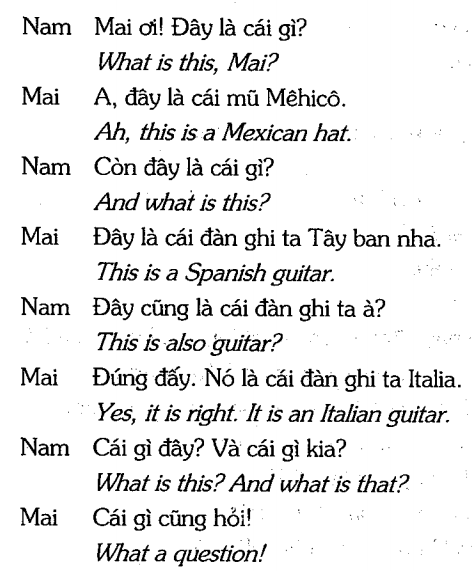Vietnamese Study: At the Spanish museum


You will see the notes below the video. This is what I studied today! 🙂 tôi không biết bạn đã học được gì trong Tiếng Việt (bạn = you) Tôi đã học tiếng Việt được khoảng 1 năm rồi. rồi = already Bạn đã học tiếng VIệt như thế nào? How = như thế nào…
第一节 四太太颂莲被抬进陈家花园时候是十九岁、她是傍晚时分由四个乡下轿夫抬进花园西侧后门的,仆人们正在井边洗旧毛线,看见那顶轿子悄悄地从月亮门里挤进来,下来一个白衣黑裙的女学生。仆人们以为是在北平读书的大小姐回家了,迎上去一看不是,是一个满脸尘土疲惫不堪的女学生。那一年颂莲留着齐耳的短发,用一条天蓝色的缎带箍住,她的脸是圆圆的,不施脂粉,但显得有点苍白。颂莲钻出轿子,站在草地上茫然环顾,黑裙下面横着一只藤条箱子。在秋日的阳光下颂莲的身影单薄纤细,散发出纸人一样呆板的气息。她抬起胳膊擦着脸上的汗,仆人们注意到她擦汗不是用手帕而是用衣袖,这一点给他们留下了深刻的印象。 颂莲走到水井边,她对洗毛线的雁儿说,“让我洗把脸吧,我三天没洗脸了。”雁儿给她吊上一桶水,看着她把脸埋进水里,颂莲弓着的身体像腰鼓一样被什么击打着,籁籁地抖动。雁儿说,“你要肥皂吗?”颂莲没说话,雁儿又说,“水太凉是吗?”颂莲还是没说话。雁儿朝井边的其他女佣使了个眼色,捂住嘴笑。女佣们猜测来客是陈家的哪个穷亲戚。他们对陈家的所有来客几乎都能判断出各自的身份。大概就是这时候颂莲猛地回过头,她的脸在洗濯之后泛出一种更加醒目的寒意,眉毛很细很黑,渐渐地拧起来。颂莲瞟了雁儿一眼,她说,“你傻笑什么,还不去把水泼掉?”雁儿仍然笑着,“你是谁呀,这么厉害?”颂莲揉了雁儿一把,拎起藤条箱子离开井边,走了几步她回过头,说,“我是谁?你们迟早要知道的。” 第二天陈府的人都知道陈佐千老爷娶了四太大颂莲。颂莲住在后花园的南厢房里,紧挨着三太大梅珊的住处。陈佐千把原先下房里的雁儿给四大太做了使唤丫环。 第二天雁儿去见颂莲的时候心里胆怯,低着头喊了声四太大,但颂莲已经忘了雁儿对她的冲撞,或者颂莲根本就没记住雁儿是谁。颂莲这天换了套粉绸旗袍,脚上吸双绣花拖鞋,她脸上的气色一夜间就恢复过来,看上去和气许多,她把雁儿拉到身边,端详一番,对旁边的陈佐千说,她长得还不算讨厌。然后她对雁儿说,你蹲下,我看看你的头发。雁儿蹲下来感觉到颂莲的手在挑她的头发,仔细地察看什么,然后她听见颂莲说:“你没有虱子吧,我最怕虱子。”雁儿咬住嘴唇没说话、她觉得颂莲的手像冰凉的刀锋切割她的头发,有一点疼痛。颂莲说,“你头上什么味?真难闻,快拿块香皂洗头去。”雁儿站起来,她垂着手站在那儿不动。陈佐千瞪了她一眼,“没听见四太太说话?”雁儿说,“昨天才洗过头。”陈佐千拉高嗓门喊,“别废话,让你去洗就得去洗,小心揍你。” 雁儿端了一盆水在海棠树下洗头,洗得委屈,心里的气恨像一块铁坠在那里。午后阳光照射着两棵海棠树,一根晾衣绳栓在两根树上,四太大颂莲的白衣黑裙在微风中摇曳。雁儿朝四处环顾一圈,后花园间寂无人,她走到晾衣蝇那儿,朝颂莲的白衫上吐了一口唾沫,朝黑裙上又吐了一口。 陈佐千这年刚好五十挂零。陈佐千五十岁时纳颂莲为妾,事情是在半秘密状态下进行的。直到颂篷进门的前一天,元配大太毓如还浑然不知。陈佐千带着颂莲去见毓如。毓如在佛堂里捻着佛珠诵经。陈佐千说,这是大太太。颂莲刚要上去行礼,毓如手里的佛珠突然断了线,滚了一地,毓如推开红木靠椅下地捡佛珠,口中念念有词,罪过,罪过。颂莲相帮去捡,被毓如轻轻地推开,她说,罪过,罪过,始终没抬眼看颂莲一眼。颂莲看着毓如肥胖的身体伏在潮湿的地板上捡佛珠、、捂着嘴无声地笑了一笑,她看看陈佐千,陈佐千说,好吧,我们走了。颂莲跨出佛堂门槛,就挽住陈佐千的手臂说,“她有一百岁了吧,这么老?”陈佐千没说话,颂莲又说,“她信佛?怎么在家里念经?”陈佐千说,“什么信佛,闲着没事干,滥竿充数罢了。” 颂莲在二太太卓云那里受到了热情的礼遇。卓云让丫环拿了西瓜子、葵花子、南瓜子还有各种蜜饯招待颂莲。他们坐下后卓云的头一句活就是说瓜子,这儿没有好瓜子,我嗑的瓜子都是托人从苏州买来的。颂莲在卓云那里嗑了半天瓜子,嗑得有点厌烦,她不喜欢这些零嘴,又不好表露出来,颂莲偷偷地瞟陈佐千,示意离开,但陈佐千似乎有意要在卓云这里多呆一会,对颂莲的眼神视若无睹。颂莲由此判断陈佐千是宠爱卓云的,眼睛就不由得停留在卓云的脸上、身上。卓云的容貌有一种温婉的清秀,即使是细微的皱纹和略显松弛的皮肤也遮掩不了,举手投足之间,更有一种大家闺秀的风范。颂莲想,卓云这样的女人容易讨男人喜欢,女人也不会太讨厌她。颂莲很快地就喊卓云姐姐了。 陈家着三房太太中,梅珊离颂莲最近,但却是颂莲最后一个见到的。颂莲早就听说梅珊的倾国倾城之貌,一心想见她,陈佐千不肯带她去。他说,这么近,你自己去吧。颂莲说,我去过了,丫环说她病了,拦住门不让我进。陈佐千鼻孔皇哼了一声,她一不高兴就称病。又说,她想爬到我头上来。颂莲说,你让她爬吗?陈佐千挥挥手说,休想,女人永远爬不到男人的头上来。 颂莲走过北厢房,看见梅珊的窗上挂着粉色的抽纱窗帘,屋里透出一股什么草花的香气。颂莲站在窗前停留了一会儿,忽然忍不住心里偷窥的欲望,她屏住气轻轻掀开窗帘,这一掀差点把颂莲吓得灵魂出窍,窗帘后面的梅珊也在看她,目光相撞,只是刹那间的事情,颂莲便仓惶地逃走了。 到了夜里,陈佐千来颂莲房里过夜。颂莲替他把衣服脱了,换上睡衣,陈佐千说,我不穿睡衣,我喜欢光着睡。颂莲就把目光掉开去,说,随便你,不过最好穿上睡衣,会着凉。陈佐千笑起来,你不是怕我着凉,你是怕看我光着屁股。颂莲说,我才不怕呢。她转过脸时颊上已经绯红。这是她头一次清晰地面对陈佐千的身体,陈佐千形同仙鹤,干瘦细长,生殖器像弓一样绷紧着。颂莲有点透不过气来,她说,你怎么这样瘦?陈佐千爬到床上,钻进丝棉被窝里说,让她们掏的。 颂莲侧身去关灯,被陈佐千拦住了,陈佐千说,别关,我要看你,关上灯就什么也看不见了。颂莲摸了摸他的脸说,随便你,反正我什么也卞懂,听你的。 颂莲仿佛从高处往一个黑暗深谷坠落,疼痛、晕眩伴随着轻松的感觉。奇怪的是意识中不断浮现梅珊的脸。那张美丽绝伦的脸也隐没在黑暗中间。颂莲说,她真怪。你说谁?三太大,她在窗帘背后看我。陈佐千的手从颂莲的Rx房上移到嘴唇上,别说话,现在别说话。就是这时候房门被轻轻敲了两记。两个人都惊了一下,陈佐千朝颂莲摇摇头,拉灭了灯。隔了不大一会,敲门声又响起来……陈佐干跳起来,恼怒地吼起来,谁敲门?门外响起一个怯生生的女孩声音,三太太病了,喊老爷去。际佐千说,撒谎,又撒谎,回去对她说我睡下了。门外的女孩说,三太太得的急病,非要你去呢。她说她快死了。陈佐千坐在床上想了会儿,自言自语说她又耍什么花招。颂莲看着他左右为难的样子,推了他一把,你就去吧,真死了可不好说。 这一夜陈佐千没有回来。颂莲留神听北厢房的动静,好像什么事也没有。唯有知更鸟在石榴树上啼啭几声,留下凄清悠远的余音。颂莲睡不着了,人浮在怅然之上,悲哀之下,第二天早起来梳妆,她看见自己的脸发生了某种深刻的变化,眼圈是青黑色的。颂莲已经知道梅珊是怎么回事,但第二天看见陈佐千从北厢房出来时,颂莲还是迎上去问梅珊的病情;给三太太请医生了吗?陈佐千尴尬地摇摇头,他满面倦容、话也懒得说,只是抓住颂莲的手软绵绵地捏了一下。 颂莲上了一年大学后嫁给陈佐千,原因很简单,颂莲父亲经营的茶厂倒闭了,没有钱负担她的费用。颂莲辍学回家的第三天,听见家人在厨房里乱喊乱叫,她跑过去一看,父亲斜靠在水池边,池子里是满满一池血水,泛着气泡。父亲把手上的静脉割破了,很轻松地上了黄泉路。颂莲记得她当时绝望的感觉,她架着父亲冰凉的身体,她自己整个比尸体更加冰凉。灾难临头她一点也哭不出来。那个水池后来好几天没人用,颂莲仍然在水池里洗头。颂莲没有一般女孩无谓的怯懦和恐惧。她很实际。父亲一死,她必须自己负责自己了。在那个水池边,颂莲一遍遍地梳洗头发,藉此冷静地预想以后的生活。所以当继母后来摊牌,让她在做工和嫁人两条路上选择时,她淡然地回答说,当然嫁人。继母又问,你想嫁个一般人家还是有钱人家?颂莲说,当然有钱人家,这还用问?”继母说,那不一样,去有钱人家是做小。颂莲说,什么叫做小?继母考虑了一下,说,就是做妾,名份是委屈了点。颂莲冷笑了一声,名份是什么?名份是我这样人考虑的吗?反正我交给你卖了,你要是顾及父亲的情义,就把我卖个好主吧。 陈佐千第一次去看颂莲。颂莲闭门不见,从门里扔出一句话,去西餐社见面。陈佐千想毕竟是女学生,总有不同凡俗之处,他在西餐社订了两个位置,等着颂莲来。那天外面下着南,陈佐千隔窗守望外面细雨漾漾的街道,心情又新奇又温馨,这是他前三次婚姻中从所未有的。颂莲打着一顶细花绸伞姗姗而来,陈佐千就开心地笑了。颂莲果然是他想象中漂亮洁净的样子,而且那样年轻。陈佐千记得颂莲在他对面坐下,从提袋里掏出一一大把小蜡烛,她轻声对陈佐千说,给我要一盒蛋糕好吧。陈佐千让侍者端来了蛋糕,然后他看见颂莲把小蜡烛一根一根地插上去,一共插了十九根,剩下一根她收回包里。陈佐千说,这是干什么,你今天过生日?颂莲只是笑笑,她把蜡烛点上,看着蜡烛亮起小小的火苗。颂莲的脸在烛光里变得玲珑剔透,她说,你看这火苗多可爱。陈佐千说,是可爱。说完颂莲就长长地吁了口气,噗地把蜡烛吹灭。陈佐千听见她说,提前过生日吧,十九岁过完了。 陈佐千觉得颂莲的话里有回味之处,直到后来他也经常想起那天颂莲吹蜡烛的情景,这使他感到颂莲身上某种微妙而迷人的力量。作为一个富有性经验的男人,陈佐千更迷恋的是颂莲在床上的热情和机敏。他似乎在初遇颂莲的时候就看见了销魂种种,以后果然被证实。难以判断颂莲是天性如此还是曲意奉承,但陈佐千很满足,他对颂莲的宠爱,陈府上下的人都看在眼里。
1.搏一搏单车变摩托 English meaning:try your best to make something better.中文意思:抓住机会去努力情况会有所改善。 bok yāt bok,dāan chē bin mō tok。 例句:只要你俾心机去做,搏一搏单车都会变摩托。 (只要你认真去做,会好起来的。) 2.搞搞震冇帮衬 English meaning:put someone to trouble;trouble maker;中文意思:责怪那些看到身边的人在忙或者需要帮忙时,光顾着添麻烦或者捣乱而不去帮忙﹑做点实事的人。 gáau gáau jan,móuh bōn chan。 例句:你条友仔,搞搞震无帮衬! (你这个人,只会添麻烦一点忙都帮不上!) 3.滚水渌猪肠 English meaning:one disaster after another;The business is so bad.中文意思:形容收支减少,生意不济。也可以引申为,处于困境而雪上加霜。 gwán séui luhk jyū chèuhng。 例句:贵米都未捱完,油价又升,我份粮又滚水渌猪肠。 (米价都还没降,油价又升了,我的工资又减了。) 4.巴闭 English meaning:awesome;rude and unreasonable;中文意思:很厉害;蛮横无理。 bā…
东边的太阳 西边的月亮 Sun in the East, Moon in the West 在不同的地方相望 Looking for each other from different places 不同的轨迹 心儿在彷徨 We are on different trajectories and we are scared 期盼有一天交汇的目光 Expecting to one day see each other 东边的哥哥 西边的妹妹 Eastern Sister, Western Brother 一起守候地老天荒 Both waiting for eternity 相思的苦水 在心里流淌 A bitter yearning in our…
1、 钱钟书:《围城》 幽默源于智慧,智慧写尽人生! 2、 路 遥: 《平凡的世界》 正视苦难,震撼心灵;平凡的世界,伟大的人生! 3、 金庸:《倚天屠龙记》、《射雕英雄传》、《天龙八部》、《笑傲江湖》、《神雕侠侣》、《鹿鼎记》、《飞狐外传》 “凡有井水饮处,皆看金庸”,金庸的武侠雅俗共赏,是一道百看不厌的风景! 4、 王朔:《一半海水,一半火焰》、《浮出海面》、《动物凶猛》、《过把瘾就死》 痞子是一种误读,其实王朔深藏不露,是地道的言情高手! 5、王小波:《黄金时代》、《未来世界》、《革命时期的爱情》、《似水流年》 黑色而幽默,特立而独行,一把独立思考的匕首,扎进时代的肺中! 6、 张爱玲: 《金锁记》、《倾城之恋》、《红玫瑰与白玫瑰》 又世俗,又贵族,又虚无;风情万种的智慧女人,笔下字字珠玑! 7、 沈从文: 《边城》 如一幅极具东方神韵的水墨山水,怎一个美字了得! 8、 默 默: 《四十大惑》、《我在梦见你》 灵性的默默、梦幻的默默是又一个天才;默默的世界,透着纯净! 9、 尹丽川: 《贱人》 迷茫的灵魂,穿着反叛的外衣,加上骨子里抹不掉的性感! 10、石 康: 《晃晃悠悠》 久违的青春和曾经沧海的初恋,就这么晃晃悠悠的过去了! 11、顾 城: 《英儿》 童话诗人的另类人生,纯粹的爱情,无法承受,生活之重! 12、安妮宝贝:《彼岸花》 灰色、忧郁又自恋,如暗夜里的春光,有一点颓废,有一点旖旎! 13、贾平凹: 《废都》 平凹是个才子,《废都》是锅杂烩;世俗百态,原形尽露! 14、古龙:《多情剑客无情剑》、《七种武器》、《楚留香传奇》 狂放不羁的浪子,潇洒落寞的剑客;留给世界一道孤傲的背影! 15、罗 珠: 《黑箱》、《巫河》 又一个诗人在编织着陷阱,要小心,再小心,别走了火,别入了魔! 16、萧 红: 《呼兰河传》 写得干干净净,又美又心碎! 17、陈忠实:…
In this context, “无所谓” means “irrelevant” or “doesn’t matter”. It’s used to convey the speaker’s lack of interest or concern about a particular topic or issue. Here, “无所谓” means “doesn’t care” or “doesn’t mind”. It’s used to indicate that the speaker has no strong preference or opinion about a decision or choice that someone else…